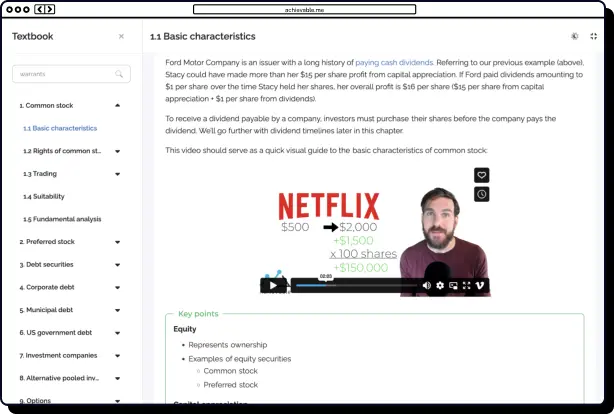
What license or licenses are required to sell variable annuities?




Variable annuities are among the most common financial instruments used for retirement planning and long-term savings. They serve as tax-deferred investment accounts that provide investors with a regular stream of income after an established date. Payments from variable annuities rise and fall in value based on the market performance of included investments.
Because of the specialized nature of variable annuities, certain licenses are required to sell these financial products. If you’re interested in selling variable annuities, you must obtain the appropriate licenses, including your state insurance license, as well as FINRA’s Series 6 or Series 7 registration.
This article will guide you through what license or licenses are required to sell annuities, outlining the role of both the Series 6 and Series 7 qualifications. By the end, you’ll understand the steps necessary to become fully licensed and ensure compliance with both state and federal regulations.

What are variable annuities?
Before we explain the licensing process required to sell these products, it’s important to first define variable annuities. Understanding these products will provide valuable context for the licensing steps and clarify why obtaining credentials to sell variable annuities is more complex than for fixed annuities.
A variable annuity is a contract established between an individual and an insurance company. In this arrangement, the insurer agrees to provide future periodic payments to the customer in return for the purchase of the variable annuity, which may be done through a one-time lump sum or via a series of purchase payments.
Variable annuities typically feature two main phases: the savings (or accumulation) phase and the payout (or distribution) phase. During the accumulation phase, purchasers can make ongoing contributions to the variable annuity contract. The insurer then invests these funds, usually in mutual funds or similar investment vehicles, and potential earnings grow on a tax-deferred basis. Once the distribution phase begins, the insurance company pays out regular income to the contract holder. Every variable annuity includes a predetermined commencement date detailing when these periodic payments will start.
Variable annuity vs. fixed annuity
A fixed annuity is another kind of insurance contract that pays investors a guaranteed interest rate on contributions to a tax-deferred account. As mentioned above, interest rates for variable annuities fluctuate based on portfolio performance. A life insurance license is the only credential needed to sell fixed annuities, while selling variable annuities requires additional certifications.
How to get licensed to sell variable annuities
Obtaining the proper licenses to sell variable annuities is a complex process. Because variable annuities are insurance products that also function as investment vehicles connected to the stock market, selling them requires more than just an insurance license. You must also secure a securities license, which generally involves passing the Series 7 exam administered by FINRA and overseen by the Securities and Exchange Commission (SEC). Let’s break down the steps required to obtain both your insurance and securities licenses so you’re fully qualified to offer variable annuities.
State life insurance license
Since variable annuities are classified as a form of life insurance, obtaining a state life insurance license is essential before you can discuss these products with clients. To secure your state life insurance license, you typically need to meet specific state requirements, which often include passing a life insurance exam. In many states, you must complete a pre-licensing course prior to sitting for the life insurance exam, while others allow you to take the exam without additional coursework.
Because the exact process for earning your state life insurance license and passing the life insurance exam varies by location, it’s important to review the guidelines provided by your state’s department of insurance. Visit your state’s official insurance department website for comprehensive details on licensing procedures and exam requirements.
Securities license
Once you have successfully obtained your state life insurance license and passed your life insurance exam, the next essential step is to get a securities license from the SEC. To legally sell variable annuities, you must hold either a FINRA Series 6 license or a FINRA Series 7 license. The Series 6 license allows life insurance agents to offer variable annuities and other limited securities products. Alternatively, securing a Series 7 license enables you to sell all products permitted under a Series 6 license, plus a broader range of investment and securities offerings.
To earn your FINRA Series 6 or Series 7 license, you must first pass the Securities Industry Essentials (SIE) exam, an introductory test required by FINRA. After passing the SIE, obtaining sponsorship from a FINRA member firm or a self-regulatory organization is mandatory before you can register for the Series 6 or Series 7 exam.
These securities licensing exams are challenging, so it’s crucial to prepare thoroughly, whether through self-study or by enrolling in a specialized test prep program such as Achievable. Passing your Series 6 or Series 7 exam is a key milestone that allows you to combine your state life insurance license with essential securities credentials for your financial services career.

Conclusion
Variable annuities are one of many products that insurance agents and advisors can provide to clients exploring long-term savings options, but their complexity requires financial professionals to obtain specific certifications. Successfully passing the life insurance exam is your first step toward securing a state life insurance license, which qualifies you to advise clients on a wide range of insurance products. Once you have also earned your securities license, you are fully authorized to sell variable annuities and other investment-linked insurance solutions.
While embarking on the journey to obtain your state life insurance license and your securities license might feel overwhelming, mastering both credentials is essential for a rewarding career in the financial services industry. With each licensing exam completed, you’ll be one step closer to advising clients and helping them secure financial freedom well into retirement.

